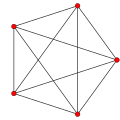Top Qs
Timeline
Chat
Perspective
1 52 honeycomb
From Wikipedia, the free encyclopedia
Remove ads
In geometry, the 152 honeycomb is a uniform tessellation of 8-dimensional Euclidean space. It contains 142 and 151 facets, in a birectified 8-simplex vertex figure. It is the final figure in the 1k2 polytope family.
Remove ads
Construction
It is created by a Wythoff construction upon a set of 9 hyperplane mirrors in 8-dimensional space.
The facet information can be extracted from its Coxeter-Dynkin diagram.
Removing the node on the end of the 2-length branch leaves the 8-demicube, 151.
Removing the node on the end of the 5-length branch leaves the 142.
The vertex figure is determined by removing the ringed node and ringing the neighboring node. This makes the birectified 8-simplex, 052.
Remove ads
Related polytopes and honeycombs
Remove ads
See also
References
- Coxeter The Beauty of Geometry: Twelve Essays, Dover Publications, 1999, ISBN 978-0-486-40919-1 (Chapter 3: Wythoff's Construction for Uniform Polytopes)
- Coxeter Regular Polytopes (1963), Macmillan Company
- Regular Polytopes, Third edition, (1973), Dover edition, ISBN 0-486-61480-8 (Chapter 5: The Kaleidoscope)
- Kaleidoscopes: Selected Writings of H.S.M. Coxeter, edited by F. Arthur Sherk, Peter McMullen, Anthony C. Thompson, Asia Ivic Weiss, Wiley-Interscience Publication, 1995, wiley.com, ISBN 978-0-471-01003-6, GoogleBook
- (Paper 24) H.S.M. Coxeter, Regular and Semi-Regular Polytopes III, [Math. Zeit. 200 (1988) 3–45]
Remove ads
Wikiwand - on
Seamless Wikipedia browsing. On steroids.
Remove ads
 ...
...






 ,
,  ...
...



